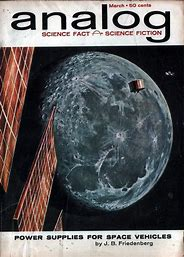The characters whom the omniscient narrator labels "Zero" and "One" communicate with each other and with others of their kind by radio pulses, not by air vibrations. Thus, they have no idea that anyone else refers to them by uttered sounds or corresponding printed symbols. Zero is so designated:
"...because he, like any consciousness, was the center of his own coordinate system..." (p. 177)
- and One because she is:
"...the most important dweller in Zero's universe..." (ibid.)
Thus, in this case, "Zero" and "One" mean little more than "I" and "you." Each of us says "I" as the centre of his or her own coordinate system. Obviously the terms would have been reversed if section I had been narrated from the point of view of the character who is regarded as female because "she" remains in their cave "creating" (ibid.) while Zero goes out to hunt game. This game is not animals with edible flesh and potable blood but "motiles" with concentrated energy and reusable parts.
One helps Zero to fasten a carrier rack on his shoulders. He has shoulders. We still do not know whether he is wheeled, winged, bipedal, quadrupedal etc. He also carries weapons. Motiles beware. We need an explanation of this techno-ecology (techology) but that will come. We have just made it onto the second page of the text.

4 comments:
BTW, Poul's ROMA MATER series has fallen prey to advancing research too -- in that case, advancing historical research.
For a long time the historical consensus was that the late Roman Empire was a transitional stage to the medieval period.
With things like the "colonate" being a step towards medieval serfdom, and a transition away from earlier Roman mass slavery.
That's how Poul and Karen showed it in those books.
The more recent consensus is that this simply isn't so. The ancient slave system continued pretty much down to the end of the Empire; and then it collapsed really, really quickly, as the market for surplus crops vanished and large-scale trade ceased.
Likewise, the colonate wasn't an early stage in "tying peasants to the land". The whole Roman property system just evaporated with the fall of the Empire, in most of the western territories.
What emerged was a series of localized peasant societies, over which the upper classes of the barbarian kingdoms exercised -political- authority, and taxation.
Then the Carolingian and post-Carolingian periods saw feudalism emerge in a few centuries, as political authority was decentralized, ultimately down to the "knight's fee" level, and manorialism emerged from that.
Not only futuristic sf but also historical fiction can become alternative history.
Paul: correct.
Historical research has developed new investigative techniques lately -- ancient DNA tech, for example, which overthrew a lot of archaeological theories which had wide currency.
Kaor, Mr. Stirling!
Fascinating, these comments! Part of me, as a hardcore Andersonian, regrets how these advances in historical knowledge dated THE KING OF YS. Another part of me wonders how the Andersons might have written ROMA MATER and its three sequels if they had known then what we now know.
One of the longest letters I wrote to Poul (and in this case Karen) Anderson was solely about THE KING OF YS, in nine single spaced pages. Among other things I talked about how my reading of Roman history included J.B. Bury's HISTORY OF THE LATER ROMAN EMPIRE FROM THE DEATH OF THEODOSIUS I TO THE DEATH OF JUSTINIAN I and A.H.M. Jones' THE LATER ROMAN EMPIRE. Anderson recommended to me other works like Edward Luttwak's THE GRAND STRATEGY OF THE ROMAN EMPIRE.
Any COMPLETE COLLECTED WORKS OF POUL ANDERSON should include with THE KING OF YS not only the notes the Andersons wrote for these books but also an essay discussing how these advances in historical knowledge should correct their view of the Later Empire.
Ad astra! Sean
Post a Comment